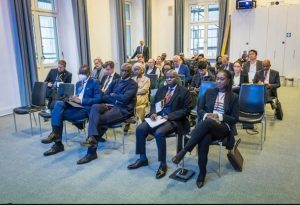Hamburg Sustainability Conference (HSC) 2024
Mr. James Muhati, Principal Secretary, State Department for Economic Planning,attended and represented the Cabinet Secretary, the National Treasury and Economic Planning, Hon. CPA. John Mbadi, at the Hamburg Sustainability Conference (HSC) 2024 in Hamburg, Germany on 9th October,2024.
The HSC, an annual conference, served as a platform for close dialogue between heads of state and government and decision makers from international institutions, private sector, civilsociety and academia. HSC provided space for concrete agreements and initiatives, to facilitate collaborative efforts to develop solutions for speedier attainment of the Sustainable Development Goals (SDG) and making effective headway on the requisite investment effort required from government and private sector.
The HSC 2024 covered the following three areas: Reshaping the International Financial Architecture; Unleashing Investments for the SDGs; and Leveraging Transformation. It is notable that the HSC 2024 is a follow-up on the outcomes of the United NationsSummit of the Future which was held in New York in September 2024. About 1,600 participants from 102 countries discussed a wide range of issues in more than 60 sessions.
Among sessions attended by the Principal Secretary, State Department for Economic Planning was the Opening Ceremony which was presided by the Federal Chancellor Olaf Scholz and other High Level Panel Speakers which laid ground and expected outputs from the conference.
On the Session on trade – the discussion focused on how trade can be used to make the SDGs work. The panel explored the possibilities of aligning trade and climate systems and presentedactionable reform strategies that could promote a sustainable future. Stronger connections between the WTO and the UNFCCC COP process, was advocated for to enhance the effectiveness of trade in advancing climate initiatives.
In the closed session presided over by Sir Masood Ahmed, President Emeritus of the Centre for Global Development and attended by selected countries which included Kenya, delved on the theme of ’a fair and just international financial architecture – options for the world bank.’ Governments represented agreed that the current International Financial Architecture needs reform and specific proposals were discussed, which would ensure that the proposed model is fit for purpose, fair, inclusive and just. It was also proposed that the financial model should be able to cater for Africa’s most current development challengesof debt sustainability and climate vulnerabilities to enable achievements of SDGs and Agenda 2063.
In the AI Session – Responsible AI for Sustainable Development, the Hamburg Declaration on Responsible AI for the SDGs will establish shared principles for leveraging AI in international development while ensuring its accessibility to all.
The session on AI and Mobility Data for All, explored strategies for bridging data gaps and ensuring equitable access to mobility data, AI technology, and expertise, with a focus on overcoming challenges in underserved regions.






